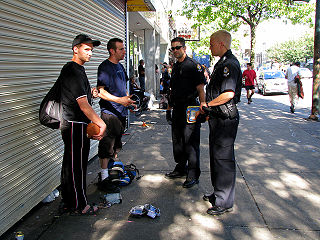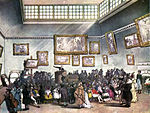
An auction is usually a process of buying and selling goods or services by offering them up for bids, taking bids, and then selling the item to the highest bidder or buying the item from the lowest bidder. Some exceptions to this definition exist and are described in the section about different types. The branch of economic theory dealing with auction types and participants' behavior in auctions is called auction theory.
A grey market or dark market is the trade of a commodity through distribution channels that are not authorised by the original manufacturer or trademark proprietor. Grey market products are products traded outside the authorised manufacturer's channel.
Confiscation is a legal form of seizure by a government or other public authority. The word is also used, popularly, of spoliation under legal forms, or of any seizure of property as punishment or in enforcement of the law.
Unowned property includes tangible, physical things that are capable of being reduced to being property owned by a person but are not owned by anyone. Bona vacantia is a legal concept associated with the unowned property, which exists in various jurisdictions, with a consequently varying application, but with origins mostly in English law.

In property law, lost, mislaid, and abandoned property are categories of the common law of property which deals with personal property or chattel which has left the possession of its rightful owner without having directly entered the possession of another person. Property can be considered lost, mislaid, or abandoned depending on the circumstances under which it is found by the next party who obtains its possession.
The Philadelphia Mint is a branch of the United States Mint in Philadelphia. It was built in 1792 following the Coinage Act of 1792, in order to establish a national identity and the needs of commerce in the United States, and is the first and oldest national mint facility.
Consignment is a process whereby a person gives permission to another party to take care of their property and retains full ownership of the property until the item is sold to the final buyer. It is generally done during auctions, shipping, goods transfer, or putting something up for sale in a consignment store. The owner of the goods pays the third-party a portion of the sale for facilitating the sale. Consignors maintain the rights to their property until the item is sold or abandoned. Many consignment shops and online consignment platforms have a set time limit at which an item's availability for sale expires. Within the time of contract, reductions of the price are common to promote the sale of the item, but vary by the type of item sold.

Asset forfeiture or asset seizure is a form of confiscation of assets by the authorities. In the United States, it is a type of criminal-justice financial obligation. It typically applies to the alleged proceeds or instruments of crime. This applies, but is not limited, to terrorist activities, drug-related crimes, and other criminal and even civil offenses. Some jurisdictions specifically use the term "confiscation" instead of forfeiture. The alleged purpose of asset forfeiture is to disrupt criminal activity by confiscating assets that potentially could have been beneficial to the individual or organization. Asset forfeiture was found to generally increase with the percentage of the assets retained depending on electoral incentives.

Possession of stolen goods is a crime in which an individual has bought, been given, or acquired stolen goods.
Ritchie Bros. Auctioneers (RBA), or simply Ritchie Bros., is a publicly traded American-Canadian-domiciled company with headquarters in Westchester, Illinois. Its common shares are traded on the Toronto and New York stock exchanges.

Bidding is an offer to set a price tag by an individual or business for a product or service or a demand that something be done. Bidding is used to determine the cost or value of something.

Simon Chorley Art & Antiques is an art auctioneer and art valuation company, based in Gloucester, England. The company was founded in 1862, and conducts auction sales and carries out valuation services for private clients for insurance purposes, probate, family division and sale.

In auctions, the buyer's premium is a charge in addition to the hammer price of an auction item, or lot. The winning bidder is required to pay both the hammer price and the percentage of that price called for by the buyer's premium. It is charged by the auctioneer in addition to the commission which has always been charged by auction houses to sellers. All of the buyer's premium is retained by the auction house and is not shared with the item's seller.

The confiscation of Armenian properties by the Ottoman and Turkish governments involved seizure of the assets, properties and land of the country's Armenian community. Starting with the Hamidian massacres and peaking during the Armenian genocide, the confiscation of the Armenian property lasted continuously until 1974. Much of the confiscations during the Armenian genocide were made after the Armenians were deported into the Syrian Desert with the government declaring their goods and assets left behind as "abandoned". Virtually all properties owned by Armenians living in their ancestral homeland in Western Armenia were confiscated and later distributed among the local Muslim population.
PropertyRoom.com is a live online auction website that sells confiscated police goods and approved third party merchant merchandise to the highest winning bidder. PropertyRoom.com is the largest online police auction website in the United States.

The Gurlitt Collection was a collection of around 1,500 art works inherited by Cornelius Gurlitt, the son of one of Hitler's official art dealers, Hildebrand Gurlitt (1895–1956), and which was found to have contained several artworks looted from Jews by the Nazis.

A government auction or a public auction is an auction held on behalf of a government in which the property to be auctioned is either property owned by the government or property which is sold under the authority of a court of law or a government agency with similar authority.

The Spanish confiscation was the Spanish government's seizure and sale of property, including from the Catholic Church, from the late 18th century to the early 20th century. It was a long historical, economic, and social process beginning with the so-called "Confiscation of Godoy" in 1798—although there was an earlier precedent during the reign of Charles III of Spain—and ending on 16 December 1924.

Emma Bailey was an American auctioneer and author, credited with being the first American woman auctioneer. She held her first auction in Brattleboro, Vermont, on May 12, 1950, as a way to supplement her family's income. In 1952 she became the first woman admitted to the National Auctioneers Association. She continued auctioneering for nearly 20 years and wrote a book about her experiences, entitled Sold to the Lady in the Green Hat (1962), before retiring in the late 1960s.
The Vugesta for "Vermögens-Umzugsgut von der Gestapo" was a Nazi looting organization in Vienna that from 1940 to 1945 seized the possessions of 5,000-6,000 Viennese Jews. It was a key player in the aryanization of Jewish property, redistributing private property stolen from Jewish Austrians to non-Jewish or Aryan Austrians during the Nazi reign in Austria.








